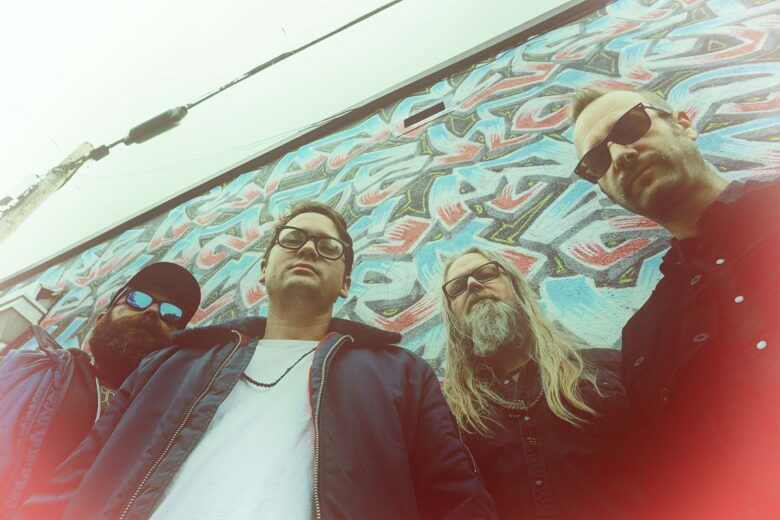On their sophomore full-length album, No Easy Way Out, Portland, Oregon’s Supplemental Pills examine tragedy underneath a bed of pulsating drone-rock following the murder of their bass player Aron Christensen in 2022. Inspired by artists like Spacemen 3, The Velvet Underground, and The Brian Jonestown Massacre, the band is comprised of Ezra Meredith (vocals/guitar), his brother Joel Meredith (guitar), Andy Foster (bass), RonJon Datta (keyboards), and Mark Folkrod (drums/backing vocals). The five-piece follow-up on last year’s Volume 1 with a dark, psychedelic, druggy sound that they refer to as “cerebral music.”
“We do a lot of things: heavy blues, psychedelic, and atmospheric rock. It’s not as psychedelic/jammy as our first record. It’s more dark and brooding. It has some jams in it, but it’s far more focused,” says Ezra of the new album’s sound.
Tragically, the biggest story on the Supplemental Pills front isn’t their sound, but the death of Aron Christensen, who was murdered while on a hike with his four-month-old puppy, Buzzo. Inept police work, a lazy district attorney, and a host of questions that will probably never be answered have lead many news outlets, including the Wall Street Journal, to write about Aron’s mysterious murder. However, prior to his passing, Supplemental Pills were finishing up what would become No Easy Way Out, an eight-track collection of songs that explore, examine, and contemplate life, death, and how nobody makes it out alive.
“Aron knew about the struggles of life, and how hard it is to get out of bed every morning and deal with the day-to-day,” comments Ezra, discussing the theme behind the album. “He could understand the darkness, look at it in the eye, realize what it was, and attempt to deal with it. We’d often talk about struggles we were going through, and how it’s super-hard to get through life at times. He could understand that better than most people I’ve ever met.”
Ezra, who admits he’s not a lyrical person, put a lot of emotions into the lyrics on No Easy Way Out. The album has been an outlet for him in dealing with a host of personal tragedies that were going on in his life at the time, including the devastating loss of another close friend, which he writes about on the album’s final track, “Goodbye Reno.”
“I’m not much of a lyric person, but on this record the lyrics are very serious, because I was dealing with a lot,” he says, discussing the album’s lyrics. “It’s not really personal, but there is a line in the song ‘Babylon,’ I think it’s the chorus, ‘God’s alive looking for soldiers, Satan’s on the come around all day long looking for answers, while Babylon keeps rolling down.’ I don’t know how I came up with that line, but it captures what people have been observing across America the past several years. Nothing seems to be working out, everything seems to be falling apart. There is certainly joy to be found, but if you’re like me, or a band like us, you get caught in the dark places of life and it’s easier to reflect on that, at least for me.” This feeling permeates the album and is profoundly expressed on the droney opening track “Judgement Time”, written by the late Mark Lanegan.
The album’s title track is about life and how it’s hard to get out of tragic situations, while “Rest My Soul” examines the thoughts and feelings about just wanting to lay down and die. “It’s about looking for a place to get it over with,” admits Ezra. “And I think truth is begging…for truth in a society and your own circle of friends and family.”
Following the death of Christensen, a founding member who recorded both bass and synth parts on the album, Ezra changed some of the lyrics on “No Easy Way Out,” while other lyrics took on a new meeting.
“They aren’t necessarily about [Aron], but I did change some lyrics, including the lyrics at the end of ‘No Easy Way Out’ that specifically deal with Aron,” says Ezra. “Everything else was done before he died. We were mixing it, and near the end of the mixing process was when he passed. If you just listen to the lyrics, they point to the tragic problems of life and questions of what is life worth? What does it mean? Why are we here? And, how do we deal with tragedy, because that’s what it was all born out of.
“Aron’s death makes the record carry a heavier weight, because he’s not here. It hits harder when I listen to it. It’s our job to carry on his legacy. It’s different than when he was around and I could tell him ‘great job’, and I can’t do that now. It’s sad to listen to sometimes, at least for me personally.”
Other songs take on a more macro approach to life, discussing the tragedies of society as a whole.
“‘Babylon’ deals with where we are as a culture, as a society, and the clashing of good versus evil, and watching things fall apart and not knowing how to react,” comments Ezra. “It’s about cities in general, but it’s about Portland. The lyrics came out of thin air, but it’s stuff I think about a lot. We see the crumbling of society, but nobody is reflecting on how we got there. They’re just looking for answers to correct, like band-aid solutions. People fight and there is no reflection from our political class, or anyone else that is considered a leader. It’s always just moving forward at a breakneck speed.”
Though he wrote the lyrics, Ezra makes it very clear it’s not his band, he’s just one-fifth of the band and everyone contributed to make the record.
“We were gonna call the record Rest My Soul, but I didn’t like how it sounded like an individual statement. We’re a band, and everyone is always bringing stuff to the table. It’s just not my band, I’m just one-fifth of it, so I thought No Easy Way Out sounded more like a group,” he says matter-of-factly. “With the loss of Aron, it made more sense. We’re dealing with a painful situation, and there’s just no easy way out of it. The song No Easy Way Out is long and has a lot going on in it, so it felt to us like the album centered around it.”
The band’s first album, Volume 1, released in 2022, mostly came about from the band jamming out ideas and Ezra then editing a collage of soundscapes to create songs. However, with No Easy Way Out, they actually set out to write songs, using very little editing this time around.
“With this set of songs, Joel came up with many of the core musical concepts during the pandemic, when we weren’t really getting together much. He would come over to my house with a new song concept, and we’d demo it with a drum machine. I’ve never made demos, so this was the first time we worked in that way,” details Ezra. “He would come over, lay down some ideas, and I would do lyrics the next day or the next week, just making up stuff, and then later try to come up with something more concrete. We’d then take that demo to Mark and Aron and they’d work up complementary parts. When we were finally able to get back together again, we’d rehearse at Aron’s house, working to transform the rough demo concepts into something we could present live and on record. That’s what was different this time – we were actually working on songs, versus the first record, which was based around a bunch of jams that I made into songs with heavy editing. Every offering on this album was written as an actual song.”
Between Volume 1 and No Easy Way Out, the band added keyboard player RonJon Datta and, following the demise of Christensen, bass player Andy Foster, Aron’s close friend and roommate (Andy had also played some 12-string acoustic guitar on the record).
“We were initially looking to fill out our sound with another guitar player,” Ezra says, discussing the addition of RonJon. “We still talk about that. But, we were pretty much done finishing up the record, and one day my friend RonJon sent me a text that said, ‘your band could benefit from a keyboard player.’ I thought that was funny and replied ‘yeah, that’s probably true, man.’ Since he came onboard we now have a much fuller sound and we rarely talk about bringing in another guitar player. His playing complements the band’s sound perfectly.”
Originally the band had Aron playing synth on the record, and he would use foot pedals to play synth with his feet at live shows while manning the bass with his hands. “The setup was quickly getting complicated for Aron and involved a lot of gear he’d have to carry to gigs,” admits Ezra. “Having RonJon in the band freed him up from that and made everything better.”
As for the addition of Andy, Ezra states, “Andy and Aron are similar in style. It worked out better than we could’ve ever imagined. He was the perfect guy to step into Aron’s spot. I mean, obviously everyone has their own way of playing, and Andy is different than Aron, but it’s not that far off. They both were into the same type of music, for the most part.”
With No Easy Way Out finished and set for release July 21st, Ezra contemplates where the band fits in, and comes to the conclusion the band doesn’t.
“I don’t think it has a place. It’s a weird kind of music. It doesn’t really fit in. Some people like it. There is a lot of repeating elements. It’s a form of music for people to get into if they want to be taken away to somewhere else. It’s more like post-punk – for people who like Joy Division, who just don’t want to be here. It’s about dealing with life when you didn’t ask to be here. You’re just born and you’re here; you don’t pick your parents, your race, or your gender. But there you are, in a town, a city, on a farm, you try to gain consciousness and try to wade through the waters of life.”
It may not have a specific, defined place, but that doesn’t mean the band isn’t excited, or proud, about the record, because the band is quite thrilled to release it and get it out into the world.
“At the time it was myself, Mark, Joel, and Aron, and the four of us produced the record. We all individually think, and I know Aron said this to me before he passed, that it was the best thing he’d/we’d ever done. Mark said the same thing, as well as Joel, and I think so, too,” beams Ezra. “As far as the four of us are concerned, it’s the best thing we’ve worked on to date. I think the next album will (hopefully) be even better than this one, but for this record, we all feel pretty strongly that it turned out how we wanted it to.”
“We want people to listen to it and think of Aron, because we love him and he’s all over it. We want to have this album be a springboard for our next album, which we’ve already started working on. I don’t have any delusions of grandeur but we just want people to like it. We know it’s not for everyone.”




